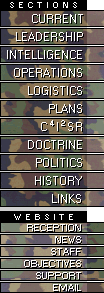





An Army of None ?
Military Culture and Junior Officer Retention
May 7, 2001

verywhere you look the headlines tell the story: "Military Losing its Best and Brightest," "More Than Rank Splits Army's Stars and Bars," "Army Officers Leaving in Droves." The national media has painted a bleak picture concerning officer retention, and most would agree that the Army is having a difficult time retaining its junior officers.
To address the officer retention issue, our civilian leadership has recently taken several steps, most noticeably: increased pay, and better retirement benefits focused at mitigating the departure of these junior officers.
Despite these initiatives, the Army may be unable to fully man the force with competent, trained and qualified company grade officers in the coming years without implementing innovative and aggressive institutional changes focused on rebuilding our military culture.
The armed forces as a whole are facing an officer retention problem, but the Army is only addressing portion of the problem. The breakdown of the Army's institutional culture is the chief catalyst of the officer retention problem and the primary contributor to our leadership dilemma.
A recently released and controversial Army study conducted by Dr. Leonard Wong, a recently retired Army lieutenant colonel, focused on generational gaps and its influence on officer attrition. In the report, Dr. Wong contends that the primary reason for the retention problem is due to a generation gap between the Army's senior and junior officers.
The Army's military culture has dissolved over the past 50 years, not because of a "generation gap" but because of a merging of both the military and civilian cultures. A strong, well-defined culture built on the past traditions and history of the Army is critical to a healthy military institution. A vibrant military culture is so important it may have devastating effects on military readiness if left unaddressed.
If the Army is to address fully the issue of officer retention, perhaps it should take a close look at the retention efforts of Born Information Services. Founded by Rick Born in 1990, BIS is one of the most successful and fastest-growing information technology-consulting firms nationwide.

This extraordinary growth is not what makes the company unique; it's their company culture, a unique company environment that has allowed them to grow and retain workers where the industry turnover rate averages 40-45 percent; BIS is able to maintain a 15 percent turnover rate.
When the company opened for business a decade ago, Rick Born developed a leadership philosophy that went beyond tangible pay incentives and supplemental benefits and included a company identity that his employees could identify with. Born had to develop and promot a company culture that his employees could believe in.
In a recent article for Atlanta Business Chronicle, Richard Stansbury, branch manager of Born's Atlanta office said, "It's a culture. We work hard, and Born makes sure we have everything we need to play hard."
Employees don't stay at BIS solely for the financial incentives, nor do they leave because of a "generational gap" between junior and senior employees. BIS employees stay because of the strong "company culture" and the feeling of team unity. Conversely, junior officers won't stay in the Army solely because of the tangible benefits they receive in their monthly paycheck, but because of the intangible wealth that a healthy military culture can provide.
The Army will always be a "young man's" profession just as today's "high-tech" industries are dominated by the talented young adults of "Generation X". BIS isn't suffering from a "generational gap" and neither is the Army.
So what is a healthy military culture? It is a recipe of many ingredients that provide a basic framework of moral and institutional values. Additionally, it is the rich Army history interwoven with customs, traditions and a "warrior spirit." Over time it has evolved and matured into the foundation of our institutional principles. Increased pay and benefits are by no means the singular answer to the officer retention problem. Our objectives should be to emphasize the institutional aspects of military service versus the occupational.
If Army leaders at all levels elevate and promote our military culture by building upon esprit de corps and team unity, which is often lacking in the civilian world, it is probable that more officers will continue their military service regardless of the economic situation.

To illustrate the power of "military relationships," a survey conducted by the U.S. Army Research Institute for the Behavioral and Social Sciences (ARI) asked company grade officers what they "most liked" about being an officer. Of almost 19,000 surveyed, the top four categories in order were: Opportunity to Command, Patriotism, Working with soldiers and Camaraderie. Clearly officers most enjoy the opportunity to command (42 percent response). It is this opportunity to lead and train soldiers and the development of "esprit de corps" that provides a sense of accomplishment and camaraderie that can only be found in the military culture. Additionally, many officers expressed their sense of pride in fulfilling their "patriotic duty" and the pride and prestige that comes along with being an Army officer. Perhaps the response that best underscores the value of a strong and healthy military culture was the officer that simply stated he "enjoyed being a soldier."
It is important to note that these surveys clearly show a common ground that officers share within the area of relationships and military culture, and it is just as important to note that neither pay nor benefits were mentioned. The Army has realized that it will never be able to compete with the civilian sector in pay and incentives; our elected representatives would never allow it, nor could the taxpayer afford it. For that reason, leaders must identify and promote our military culture as our core strength in an effort to reduce officer attrition.
To facilitate a revitalization of our military culture, leaders must identify and implement institutional changes in order to reduce the voluntary officer attrition in the active force. These steps include but are not limited to the following:
- Emphasize the Army's history and traditions. Throughout the course of American's long military history, the Army has developed a distinct culture that portrays an identity to its members as well as the general public. Service members throughout the Army do not consider themselves as part of generic armed forces but instead identify themselves as infantrymen, tankers, and artillerymen.
- Encourage participation in social events and activities. The participation of all officers in social events within the military organization must be encouraged. Social activities, whether formal or informal, serve the dual purpose of strengthening the bonds within a unit by building esprit de corps and promoting camaraderie.
- Revitalize spouse involvement in the military culture. There is a direct correlation between officer retention and spousal support/satisfaction with the Army lifestyle. Of the officers who intend to complete 20 years service, 86 percent stated that their spouse supported an Army career compared to only 31 percent of those planning to exit the service.
- Understand the differences between military and civilian cultures. Because of the nature of business executed by the military, high standards and discipline are demanded at every level. Too often our civilian leadership tries to implement social change within the military expecting it to be received and adopted with open arms. This is generally not the case. Rapid integration of controversial social initiatives such as the "Don't ask, Don't tell" policy can further complicate the challenge of sustaining soldier morale. Because our military culture has evolved into a rather conservative society, it must be understood that it will adapt slower to many of the more liberal behaviors exercised in the civilian sector.
Retaining our junior officers will require policy changes and critical leadership actions at all levels. The Army needs to address the issues of pay, retirement benefits, OPTEMPO, and job assignments, but more importantly their needs to be a focus on the Army culture as a whole. The key to officer retention is to emphasize the positive aspects of esprit de corps, camaraderie and pride in service that a strong military culture provides, and that aren't available in the civilian sector. Finally, while we are concerned with the officer who has decided to discontinue his military service, the largest percentage of junior officers fall into the "career" or "undecided" categories. It can not be stressed enough that we must not focus all of our attention on the officers who have decided to depart our Army and overlook the officers that have decided to stay.
Text source: Captain Rick Wright, ADA Magazine Online, March 2001
© 2001 CheckPoint |














